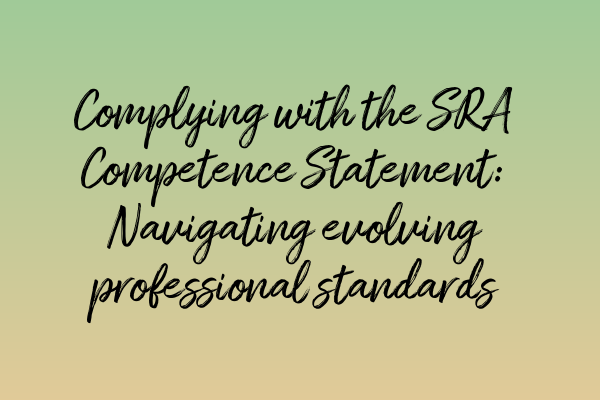Complying with the SRA Competence Statement: Navigating Evolving Professional Standards
As a solicitor, it is crucial to stay updated with the evolving professional standards set by the Solicitors Regulation Authority (SRA). The SRA Competence Statement outlines the essential skills, knowledge, and attributes that solicitors need to possess to practice law effectively. In this article, we will explore the importance of complying with the SRA Competence Statement and provide guidance on how to navigate these evolving professional standards.
The SRA Competence Statement is a comprehensive framework that helps solicitors understand the expectations and requirements of their profession. It covers six different areas, including ethics, technical legal practice, working with others, management of yourself and your work, communication, and professional values.
To comply with the SRA Competence Statement, solicitors need to continually assess their current skills and knowledge and identify any gaps that need to be filled. This process of self-assessment is crucial for professional development and ensures that solicitors are equipped with the necessary competencies to effectively serve their clients. However, navigating these evolving professional standards can be challenging. Therefore, it is essential to have a clear strategy in place.
One key consideration for compliance with the SRA Competence Statement is ongoing training and development. Solicitors should engage in regular Continuing Professional Development (CPD) activities to stay up-to-date with changes in the legal field and enhance their skills and knowledge. This could include attending relevant courses, seminars, webinars, or workshops. It is also beneficial to participate in networking events and collaborate with colleagues to gain new insights and perspectives.
In addition to CPD, solicitors should also take advantage of the valuable resources available to them. Various professional organizations, legal publications, and online platforms offer insights, articles, and updates on legal developments. Keeping up with these resources can contribute to staying informed about changes in the legal landscape and understanding how they impact the competencies outlined by the SRA Competence Statement.
One important aspect of complying with the SRA Competence Statement is understanding and maintaining professional ethics. As solicitors, we have a duty to act in the best interests of our clients and uphold the principles of integrity, confidentiality, and honesty. Adhering to these ethical standards not only ensures compliance with the SRA Competence Statement but also fosters trust with clients and enhances the reputation of the legal profession as a whole.
To further support compliance with the SRA Competence Statement, solicitors should strive to adopt effective management practices. This includes being organized, managing time efficiently, and properly documenting work. Efficient management allows solicitors to handle their workload effectively, meet deadlines, and provide quality legal services to their clients.
Communication skills are also a vital aspect of complying with the SRA Competence Statement. Solicitors must be able to communicate clearly and effectively with their clients, colleagues, and other parties involved in legal matters. Developing strong communication skills involves active listening, asking relevant questions, and conveying information in a concise and accessible manner.
Lastly, maintaining professional values is key to complying with the SRA Competence Statement. Solicitors should act with integrity, professionalism, and respect for others at all times. Upholding these values not only showcases a solicitor’s commitment to the profession but also contributes to building a positive and ethical legal community.
In conclusion, complying with the SRA Competence Statement is essential for solicitors to stay competent and deliver exceptional legal services. By continually assessing and developing their skills, engaging in ongoing training, and adhering to ethical standards, solicitors can navigate the evolving professional standards set by the SRA. Remember to keep up to date with changes in the legal field, seek professional resources and support, and prioritize ongoing development to stay at the forefront of the legal profession.
Related Articles:
– SQE Preparation for Property Practice: Mapping Out Your Strategy
– Updates in UK Property Laws: Key Changes and Implications
– Legal challenges in property transactions: A comprehensive guide
– Navigating Lease Laws in the UK: Essential Guidelines for Tenants and Landlords
– Dominate Property Law Questions: Avoiding Common Pitfalls


Leave a Reply